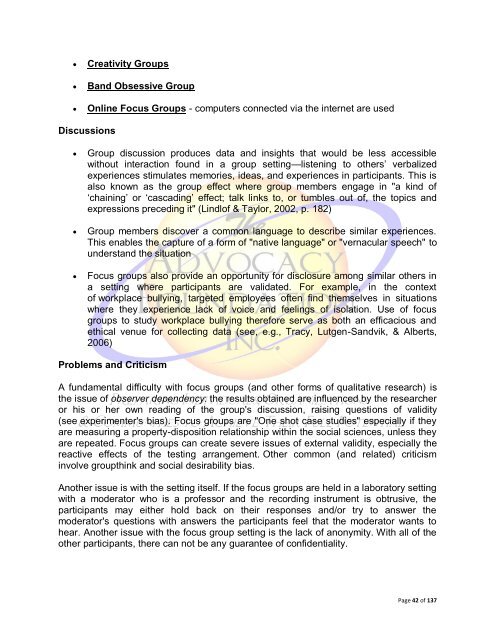Community Needs Assessment Process
Community Needs Assessment Process
Community Needs Assessment Process
You also want an ePaper? Increase the reach of your titles
YUMPU automatically turns print PDFs into web optimized ePapers that Google loves.
Creativity Groups<br />
Band Obsessive Group<br />
Online Focus Groups - computers connected via the internet are used<br />
Discussions<br />
<br />
<br />
<br />
Group discussion produces data and insights that would be less accessible<br />
without interaction found in a group setting—listening to others’ verbalized<br />
experiences stimulates memories, ideas, and experiences in participants. This is<br />
also known as the group effect where group members engage in "a kind of<br />
‘chaining’ or ‘cascading’ effect; talk links to, or tumbles out of, the topics and<br />
expressions preceding it" (Lindlof & Taylor, 2002, p. 182)<br />
Group members discover a common language to describe similar experiences.<br />
This enables the capture of a form of "native language" or "vernacular speech" to<br />
understand the situation<br />
Focus groups also provide an opportunity for disclosure among similar others in<br />
a setting where participants are validated. For example, in the context<br />
of workplace bullying, targeted employees often find themselves in situations<br />
where they experience lack of voice and feelings of isolation. Use of focus<br />
groups to study workplace bullying therefore serve as both an efficacious and<br />
ethical venue for collecting data (see, e.g., Tracy, Lutgen-Sandvik, & Alberts,<br />
2006)<br />
Problems and Criticism<br />
A fundamental difficulty with focus groups (and other forms of qualitative research) is<br />
the issue of observer dependency: the results obtained are influenced by the researcher<br />
or his or her own reading of the group's discussion, raising questions of validity<br />
(see experimenter's bias). Focus groups are "One shot case studies" especially if they<br />
are measuring a property-disposition relationship within the social sciences, unless they<br />
are repeated. Focus groups can create severe issues of external validity, especially the<br />
reactive effects of the testing arrangement. Other common (and related) criticism<br />
involve groupthink and social desirability bias.<br />
Another issue is with the setting itself. If the focus groups are held in a laboratory setting<br />
with a moderator who is a professor and the recording instrument is obtrusive, the<br />
participants may either hold back on their responses and/or try to answer the<br />
moderator's questions with answers the participants feel that the moderator wants to<br />
hear. Another issue with the focus group setting is the lack of anonymity. With all of the<br />
other participants, there can not be any guarantee of confidentiality.<br />
Page 42 of 137

















